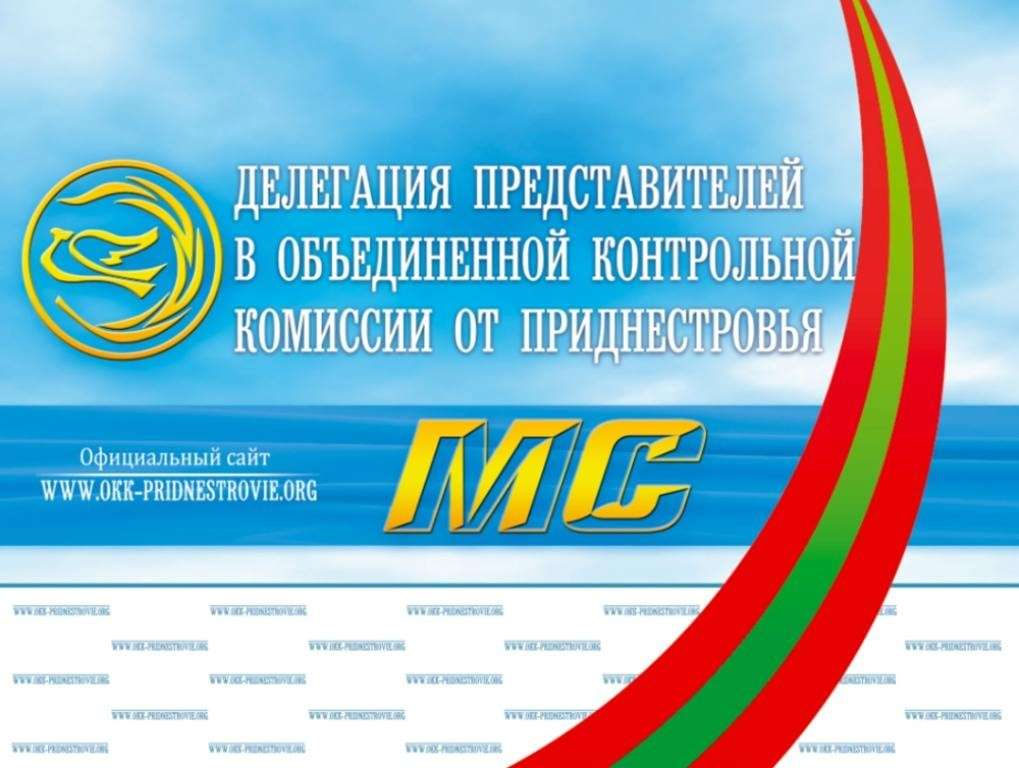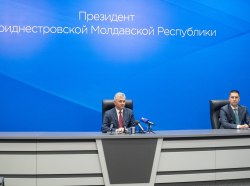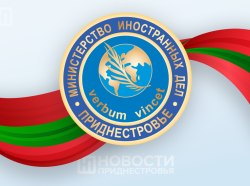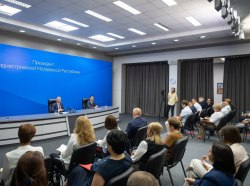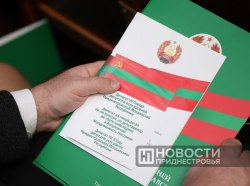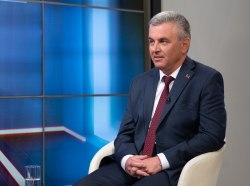At the regular meeting of the Joint control commission, the Pridnestrovian side distributed the Statement.
The text of the document is provided completely:
In January – March 2019 the Moldavian delegation distributed address No. 23-18-126 of 23.01.2019 and statement No. 23-18-387 of 12.03.2019 concerning which the Pridnestrovian delegation in the JCC intends to address with objection as it considers the contents prejudiced and tendentious.
These documents concern existence in the Safety zone of the Pridnestrovian boundary posts. Members of the Pridnestrovian delegation in the JCC repeatedly emphasized that more Moldavian delegation initiates discussion of these questions, the peacekeeping operation in general and its governing body – JCC in particular – became more politicized. The sharpness of judgments and persistence they constantly repeat it, in general, are clear as for the Moldavian side to recognize the presence of frontier guards in the Safety zone means to recognize that there is a frontier.
It is necessary to realize that still, the Moldavian side is not able to agree with it. But, as it appears, it is able to be engaged on a systematic basis in shaking of the existing mechanisms of a peacekeeping operation on the Dniester. For this purpose at this stage, the issue of stay and activity in the Safety zone of the Pridnestrovian frontier guards was also chosen. It is the political question within the competence of the negotiation process between parties of the conflict.
The Moldavian delegation in the statement accuses the Pridnestrovian delegation of attempts to convince members of the JCC and the Joint military command that boundary divisions of Pridnestrovie treat law enforcement agencies. Here it is necessary to remind the Moldavian colleagues it is not a fiction of the Pridnestrovians, but live world practice that was repeatedly emphasized with such reputable international organization as the OSCE. In this regard, we believe necessary once again to remind that according to the information which is in open access of the OSCE POLIS «Law Enforcement Agencies of the Participating Countries and Partners» border troops are a part of a law-enforcement system. It turns out, that all over the world border troops are a law-enforcement structure, and in Pridnestrovie, they are not. Should we continue polemic in this direction? Probably, is not necessary.
The Moldavian delegation in the JCC us confused with the fact that in the Safety zone there are structures of border troops of Pridnestrovie. The main argument of the Moldavian colleagues is that in border troops of Pridnestrovie there passes service the military personnel.
But it is not a question: in most the states frontier guards are in the military service. In Pridnestrovie, the situation is the same. With only one amendment that the Pridnestrovian frontier guards, as a rule, carry out the law-enforcement activity in the Safety zone without a weapon.
The Moldavian colleagues should recognize that members of the Pridnestrovian delegation in the JCC never challenged the fact that frontier guards are in the military service. And participants of the Pridnestrovian delegation as, however, and Moldavian, in the majority are in the military service from the very beginning of the peacekeeping operation, and it did not cause negative emotions so far.
In the statement, the Moldavian delegation gives a number of examples of the beginning of 1993 where the employees of boundary posts armed with an automatic weapon were noticed. Also there are given examples of later term. Something from these examples was confirmed, but a lot of things did not receive confirmation.
And the Moldavian delegation lifts these «events» before the commission, not for the first time. In reply, the Pridnestrovian delegation repeatedly reminded that activities of Moldova for import in the Safety zone of a large number of weapon and ammunition, kidnappings of citizens from the territory of Pridnestrovie by the armed police officers and a number of other examples demonstrate violations from the Moldavian side.
So, the delegation of the Republic of Moldova in the addresses leads up that since 1993 (The minutes of the JCC No. 66 of March 3, 1993) it repeatedly drew the attention of the JCC to allegedly illegality of presence and destructive activity in the Safety zone of divisions of the Pridnestrovian boundary structures, at the same time one-sidedly treats guidance documents of the JCC. According to it the presence of the frontier guards of Pridnestrovie in the Safety zone roughly violates Paragraph 2 of Article 1 of the Agreement of 1992, Paragraph 4 of the Agreement of 1998 and the relevant decisions of the JCC. But it is not true.
First of all, in this statement two mutually exclusive references to sources are made at the same time.
First, the reference to the minutes of the JCC No. 66 from March 3, 1993, in which there is a decision on granting time to the Pridnestrovian delegation for carrying out consultations with the guide to an occasion of the finding of boundary posts in the Safety zone.
Secondly, the reference to Paragraph 4 of the Agreement of 1998 (Odessa) in which, including by results of the consultations held by the Pridnestrovian delegation, the top management of parties of the conflict, in the presence of the highest representatives of guarantor states of the implementation of the Agreement of 1992 by conflicting parties, in the presence of the Head of the OSCE in the region, the JCC protocol No. 66 of March 3, 1993 was in essence closed.
That is the agreement fastened with autographic signatures of both the Head of Pridnestrovie and the President of the Republic of Moldova, the solution of an issue of the finding of the Pridnestrovian boundary posts in the Safety zone is referred to the competence of the parties of the negotiation process on settlement of the armed conflict. In fact, in the Agreement of 20.03.1998 (Odessa), it is directly specified that the Joint control commission is not competent to resolve issues of the finding of boundary posts in the Safety zone. Literally, in the Agreement it is written down and revised by signatures of participants of these negotiations including the Moldavian President, the following:
«The fourth. To develop the commissions on coordination and ensuring negotiation process in two-month time the agreed offers of rather a stage-by-stage reduction of a number of the established boundary posts between the Republic of Moldova and Pridnestrovie and other measures for the purpose of creation of the favourable mode for movement of people, goods and services».
Thus, until this clause is implemented, and it is imperative and has no subjunctive mood, any instructions on violations of requirements of the Agreement of 1992 regarding the finding of the Pridnestrovian boundary posts in the Safety zone do not correspond to reality. The President of the Republic of Moldova was one of the main signers of the Agreement of 1992, the same of the Agreement of 1998 (Odessa). It is doubtful that someone from members of the delegation of Moldova in the JCC was granted the right to disavow his signatures.
Now as for weapon on boundary posts of Pridnestrovie. In the statement, it is specified that during the period from 21.01.1993 to 09.04.2009 took place of 18 cases of the finding of frontier guards in the Safety zone with a weapon (they are listed with a complete description «illegal», according to the Moldavian side, actions of security officers). The Pridnestrovian delegation considers denying these facts inexpedient. Frontier guards of Pridnestrovie and Moldova carry out approximately identical tasks, as well as their colleagues around the world. Sometimes performance of these tasks is accompanied by the presence of a weapon at performers as criminals are quite often ready to show armed resistance. All cases of unauthorized emergency of weapon specified by the Moldavian colleagues in the Safety zone received a due legal treatment and were not only discussed at the JCC meetings but also in the department.
The point is that the existing format of a peacekeeping mission undertook all available opportunities for prevention of repetition of similar cases. The thesis of the Moldavian delegation that the existing peacekeeping mechanism does not provide control over boundary structures in a zone of responsibility of Joint peacekeeping forces, thus, does not correspond to reality.
However, it should be noted that recently the senior military chief of the peacekeeping contingent of the RM on a systematic basis blocks departures of military observers for control of the boundary and other law-enforcement structures serving in the Safety zone. As all of us well remember, the thief most loudly shouts: «Hold the thief!».
It is clear, that the behaviour of the senior VN MS RM which steadily repeats the judgment that the existing format of a peacekeeping operation is not effective cannot but be authorized by higher heads. It is difficult not to notice that in this direction the Moldavian delegation in the JCC makes considerable efforts.
In that case how to be with the following information approximately of the same time what makes a reservation in the Moldavian addresses?
According to reports of the Joint military command only from 28.07.1999 to 3.04.2008 the Moldavian security officers, unlike the Pridnestrovian colleagues (first of all frontier guards who serve without weapon), for execution of the official duties took 57 PM guns, 2 TT guns, 22 joint stock company of various modifications, 11 SKS carbines in the Safety zone.
As a rule, they had no inserts on the right of carrying a weapon in the Safety zone, and for this reason, a part of the called weapon was withdrawn by military commandants. Unfortunately, it was not a lesson for security officers of the RM and the Moldavian weapon in the same way repeatedly appeared in the Safety zone later – in 2009, 2010, 2011 and in 2012.
For example, armed police officers of the RM from the PPS battalion illegally entered into the village Varnita in summer 2011 (The area with the raised safety mode, Bendery), carried out in the residential district Severniy on October 7, 2012 detention of the participant of a road accident.
By the way, it is important to note that the RM PPS Ministry of Internal Affairs battalion in the village Varnita appeared secretly – without solution of the JCC, without notices in bodies of the peacekeeping operation.
In 2011 according to some members of the Moldavian delegation in response to the requirement of the Pridnestrovian delegation in the JCC to clear a situation the commissariat of police of that time needed this division for law enforcement in Varnita. It totaled «only» about 60 employees armed with a weapon, regular for such divisions. That is at least 60 units of small arms got to the Safety zone bypassing peacekeeping operation. The fact that military observers of four parties in this division are not allowed so far is very important. Today this division totals at about 150 employees, that means at least 150 units of small arms without solution of the JCC and even without control of the peacekeeping operation at least in the form of the oral report.
Besides, already on the Central Site of the Safety Zone (CSSZ) as of 21.07.2008 (that is time specified by the Moldavian delegation), according to the documents submitted by the Moldavian side to the JMC for receiving inserts on the right of carrying weapon, the number of units of weapon only in a commissariat of police of the village Ustie increased by 140 units, including automatic weapon (joint stock company of various modifications) – 35 units, the PM guns – 105 units. It is indicative that, giving explanations on natural questions of members of the JCC in this occasion, representatives of the Moldavian delegation said that this replacement of small arms of the Soviet sample by a weapon of the Romanian production is made. However, the answer from the Moldavian delegation to a question of the reasons of increase in a number of units of small arms at TsUZB and also as this weapon was illegally delivered in the Safety zone, did not follow.
And except this weapon, for example, in penal institutions of the MU of the RM which are illegally located in Bende illegally automatic weapon (joint stock company of various modifications) – 51 units, the PM guns – 42 units, the RPK machine guns – 2, sniper rifles – 4 units, sports guns – 5 units are used by convoy divisions of Moldova. It according to the same time to which authors of the Moldavian statements refer, received from quadrilateral military observers. And it is actually unknown how many such weapons there is in the penal institutions of the MU of RM in RPRB, Bendery today.
By the way, penal institutions and the staff which is carrying out their protection are not as they are usually called by the Moldavian colleagues, law enforcement agencies.
«A penal (criminal and executive) system (Latin poenitentia – repentance) – the system of law-enforcement bodies, the state machinery of coercion knowing execution of the criminal sanctions imposed on citizens according to the law. Provides execution of punishments both connected and not connected with imprisonment and also keeping of persons under investigation from the moment of pretrial detention (before the change of a measure of procedural suppression in the form of detention).
One of the most important activities of a modern penal system on the restoration of social justice along with retaliatory function is the prevention of a recurrence of crimes».
It is the retaliatory body to which there is no place in the center of the frozen armed conflict, it is obvious. However, the Moldavian delegation constantly blocks the question of a conclusion of OShch 29/8 and OShch 29/12 MU RM from the Bendery Area with the raised safety mode from inclusion in the agenda of meetings of the JCC. At the same time we often hear the arguments that until there is no team at the political level, there will be no solution to this problem.
In this context, a question to interested parties: how prisoners are delivered in the Safety zone and taken out from it, as it should be armed security forces? Means, weapon, in principle, at the will of the Moldavian side «walks» on RPRB Bendery. And still: how human rights are observed if convicts are carried to serve sentence in a zone smoldering armed (in the name of the Agreement of 1992 it is written down quite so – armed conflict in the Pridnestrovian region of RM) conflict, moreover, in the center of opposition where, according to the Moldavian side, peacekeeping operation does not cope with the function of peacekeeping?
Returning to a weapon problem in the Safety zone, the Pridnestrovian delegation in the JCC also reminds that without uniform notice in the JCC the Moldavian side completely re-equipped also the peacekeeping divisions, having replaced the military Soviet equipment including automobile, on the equipment consisting on arms of member countries of the military NATO alliance. The Moldavian side as practice showed, is categorically against re-equipment according to modern standards of the military contingents of MS of Pridnestrovie and even the Russian Federation.
And what to say that then (in the period of time, mentioned by the Moldavian delegation in the addresses) on the ground near the settlement Bulboake located in close proximity to the Safety zone (TsUZB), MO RM heavy artillery weapons were delivered on a constant basis. Yes, of course, it is not a Safety zone, it only «close», but the fact that it was delivered through this zone is important, but was not there since 1992.
We pay your attention that the Pridnestrovian delegation in the JCC intentionally did not take out more modern data on similar actions of the Moldavian side in the Safety zone as in the above-named statements of the Moldavian delegation distributed on commission sessions within the last two months this period is mentioned.
However, if the Pridnestrovian delegation is forced to explain constantly that law enforcement agencies of Pridnestrovie are, first of all, boundary, supplement law-enforcement activity in the Safety zone, we consider important to remind participants of work of the JCC the following data for the same period from 1993 to 2012:
- Posts of law enforcement agencies of Pridnestrovie prevented import to the territory from Moldova more than 27 kilograms of drugs, small arms (submachine guns, machine guns, carbines, rifles, guns) 219 units, 39 shoulder launchers, 1,316 grenades, 149,936 pieces of cartridges were withdrawn.
- Besides, it was revealed, withdrawn or cleared 6,454 antipersonnel mines, 2,863 anti-tank mines, 222 land mines. 3,995 other explosive objects are destroyed then.
- Repeatedly (65 times only in 2012) imports of large consignments of smuggled goods, fuel, foreign currency were prevented.
Here it is important to ask a question why they freely passed through fiscal and customs posts of Moldova. Or it was planned so?
- From 2003 for 2012 on these posts 402 crimes are solved, 121,755 protocols on administrative violations are made, 2,297 persons who are wanted are detained.
All this is without results of work of militia in the Safety zone. And here that made an inspectorate of police of the RM to Bendery and the Moldavian part of OOSG? We can transfer tens of the facts of kidnappings in Pridnestrovie and export them for Safety zone borders. By the way, the Moldavian police kidnapped even the high-ranking officer of the Pridnestrovian military contingent and kept in Chisinau within a year.
In this context, the position of the Moldavian delegation in the JCC on peacekeeping operation, on a situation in the Safety zone does not surprise anymore. However the position of the OSCE Representatives in the JCC who give all the particulars about «illegal» activity of the Pridnestrovian side «found» by them or in the course of the planned work or on «signals» of the Moldavian side which existence («signals»), in principle, is not provided by guidance documents about cooperation with the JCC is really upsets.
This activity OSCE Representatives are ready to spend, judging by their announcements, 24 hours a day, that is not provided within the JCC. And here our colleagues from OSCE do not notice illegal activity of the Moldavian side in the Safety zone at all. And it would be necessary, for example, for the sake of demonstration of objectivity of cooperation process with the JCC. (The selective list of illegal acts of the Moldavian side for the above-named period is attached).
The Pridnestrovian delegation in the JCC suggests all participants of a peacekeeping operation, participants of activity of the commission interested to structures to try to rethink the developing situation in the Safety zone, regarding unreasonable forcing of tension by one party of the conflict.
The agreement of 1992 (Article 1, 2, 3) accurately also clearly determined parameters of activity of the Joint control commission – not to allow renewal of the armed actions between conflicting parties. Moreover, according to Article 7 of the Agreement of 1992, peacekeeping operation – only one of the measures of process of settlement of the conflict peaceful political means, with the accurately certain framework of application.
The Pridnestrovian delegation urges representatives of the Russian Federation, Ukraine, the OSCE Mission in the JCC to assist returning of the commission from attempts to prove «inefficiency» of the peacekeeping operation which provides the 27th year lack of combat operations in the Dniester, to direct work on peacekeeping in the Safety zone in JCC.

